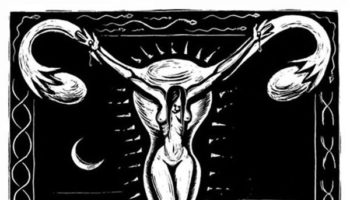Today’s post comes from Charlie Winn, who is a Pākehā third-year student at the University of Auckland, majoring in Sociology and Theological and Religious Studies. His academic interests include Sara Ahmed’s theorisation of emotion and affect, and the philosophy of Alain Badiou. Charlie is also an active member of the prison abolitionist organisation People Against Prisons Aotearoa. He plans to complete his Sociology Honours degree in 2020.
Charlie wrote this post as part of his coursework for our University of Auckland course, ‘Religious Texts of Terror’. His interrogation of John MacArthur’s sermon showcases the importance of resisting those (mis)interpretations of biblical texts which promote symbolic violence in all its forms.
If you prefer listening to reading, Charlie’s blog post can be heard in podcast form here.
Resistant Readings: John MacArthur’s Homophobic Theology
Charlie Winn
In this post, I will deconstruct and critically discuss the (mis)interpretation of a sacred text that I argue has been used to promote homophobia and intolerance. Specifically, I will be delving into a sermon given by John MacArthur, the pastor-teacher of Grace Community Church in Sun Valley, California. He is also a featured teacher on the ‘Grace to You’ media ministry, an initiative that has allowed him to distribute his books and study guides to the public in more bite-size, accessible formats, such as radio shows, YouTube videos, and podcasts. Grace to You was founded in 1969 and has developed a sizable international audience of committed followers. The sermon of MacArthur’s I will be exploring is called ‘Homosexuality and the Campaign for Immorality’, and was published on the Grace to You website on 23 September 2012. I will interrogate MacArthur’s appropriation of the Bible as a tool to condemn homosexuality, through which he uses his influential platform to incite symbolic and structural violence against a marginalised community. Throughout the 54-minute sermon, MacArthur skims over a great number of biblical passages, however, he pays particular detail to Romans 1:18-32 – often considered the most influential biblical text on same-gender relationships – and the story of the destruction of Sodom and Gomorrah in Genesis 19.
This episode is divided into three distinct areas of analysis. Firstly, I will examine MacArthur’s literal interpretation of Romans 1:18-32, in which Paul the Apostle wrote of God’s wrath towards all those who disobey them. Next, I will briefly pick apart MacArthur’s assertion that the destruction of Sodom in Genesis 19 is a reference to the sinful nature of homosexuality. Finally, in consideration of these two arguments, I will challenge MacArthur’s claim that the Bible is not political by drawing on Professor Joel Baden’s conceptualisation of the Bible as a cultural prop.
The First Resistance: Romans 1
 For many years, Romans 1:18-32 has been considered the central biblical text referencing same-gender relationships, with innumerable interpretations arising from it. Paul wrote Romans 1 due to his unease about people privileging themselves and their desires over worshipping God. He discusses the sin of human egotism and immodesty, as well as praising false idols (Punt 2007, 965-67). In MacArthur’s sermon, he adopts a conservative reading of this passage, deeming the Bible to be explicitly condemning homosexuality. Referencing Romans 1:24, MacArthur speaks of God’s abandonment of the nation that is contaminated by selfishness and vanity: “He gives them over to the lusts of their hearts to impurity.” This “impurity” is widely understood as sexual sin, implying that Paul’s Greco-Roman society has become obsessed with sex. Continuing, MacArthur references Romans 1:26-27: “Because of this, God gave them over to shameful lusts. Even their women exchanged natural sexual relations for unnatural ones. In the same way the men also abandoned natural relations with women and were inflamed with lust for one another. Men committed shameful acts with other men, and received in themselves the due penalty for their error.” In a wild stretch of the imagination, MacArthur correlates this “due penalty” with the twentieth-century HIV/AIDS epidemic and the spread of sexually-transmitted diseases. Through a very literal interpretation of this passage, MacArthur states that God’s abandonment of our world has lead to a sexual revolution, followed by a “homosexual revolution” that apparently we are living through right now.
For many years, Romans 1:18-32 has been considered the central biblical text referencing same-gender relationships, with innumerable interpretations arising from it. Paul wrote Romans 1 due to his unease about people privileging themselves and their desires over worshipping God. He discusses the sin of human egotism and immodesty, as well as praising false idols (Punt 2007, 965-67). In MacArthur’s sermon, he adopts a conservative reading of this passage, deeming the Bible to be explicitly condemning homosexuality. Referencing Romans 1:24, MacArthur speaks of God’s abandonment of the nation that is contaminated by selfishness and vanity: “He gives them over to the lusts of their hearts to impurity.” This “impurity” is widely understood as sexual sin, implying that Paul’s Greco-Roman society has become obsessed with sex. Continuing, MacArthur references Romans 1:26-27: “Because of this, God gave them over to shameful lusts. Even their women exchanged natural sexual relations for unnatural ones. In the same way the men also abandoned natural relations with women and were inflamed with lust for one another. Men committed shameful acts with other men, and received in themselves the due penalty for their error.” In a wild stretch of the imagination, MacArthur correlates this “due penalty” with the twentieth-century HIV/AIDS epidemic and the spread of sexually-transmitted diseases. Through a very literal interpretation of this passage, MacArthur states that God’s abandonment of our world has lead to a sexual revolution, followed by a “homosexual revolution” that apparently we are living through right now.
MacArthur’s argument can be countered in three distinct ways. Firstly, I will explore the “nature/natural” debate, detailed in Jeremy Punt’s article on interpretive options for Romans 1. Punt explains that in this passage, Paul’s claims are founded on what is regarded as “according to nature,” with the “unnatural” describing practices that are unconventional or going against what is socially acceptable (2007, 972). Reading this passage in the historical and cultural context of Greco-Roman society, we can understand the term “natural relations” as specifying acts that conformed to the social hierarchy – the correct way of acting. From this, Punt asserts that Paul isn’t problematizing the gender of one’s sexual partner, but is instead arguing that one’s social status and the sexual act involved must be in accordance with the social hierarchy (2007, 973). Therefore, it is redundant to apply contemporary connotations to a word written in the first century, for it most definitely would have held different cultural meanings for the audiences at the time.

The second area in which MacArthur’s argument falls flat is through his inability to recognise the dynamic character of sexuality, ever-changing throughout time. When Romans 1 was written, conceptions of gender, sex and sexuality were vastly different from today’s understandings of them (Punt 2007, 976). Engaging in a queer reading of Paul’s Romans 1, Jeremy Punt recognises that in the Greco-Roman world, sexuality wasn’t defined by homosexual or heterosexual relations, but rather determined by activity and passivity informed by social status. Men asserted their dominance through acts of penetration, whereas those further down the social hierarchy – regardless of their sex – were deemed weak, and thus vulnerable to being penetrated (Punt 2007, 976). As Stephen Moore, in his article “Que(e)rying Paul” articulates, “The reduction of sexual relations to the act of penetration enables sex to become a simple yet effective instrument for expressing hierarchical relations” (1998, 271). In the first century, gender and social status were intimately connected. And so when Paul speaks of the reversal of the gender hierarchy and gendered practices, he’s referring to the loss of social status and the consequences of humiliation that these readers could face (Punt 2007, 977). Jeremy Punt’s analysis of Romans 1 shows us that the contemporary concept of homosexuality simply didn’t exist in Paul’s time, so it is erroneous and inappropriate for MacArthur to directly apply modern notions of homosexuality to this text.
My third criticism of MacArthur’s manipulation of Romans 1 is rather straightforward – decontextualisation. At the beginning of his article, “Romans 1:26-27 and Homosexuality,” Everett Kalin (2003) identifies whom Paul is condemning in this passage, and for what sin they are being condemned. In Romans 1:18-32, God’s wrath is pointed at the Gentiles, who have failed to recognise God’s presence in creation, alternatively fabricating and worshipping their own idols (Kalin 2003, 426). However, this is not the crux of Paul’s lesson, as MacArthur so clearly makes it out to be. Just several verses later, in Romans 2:1, Paul addresses the Jews who disapprove of the Gentiles’ wrongdoing, insisting that they are judging the Other: “Therefore you have no excuse, whoever you are, when you judge others; for in passing judgement on another you condemn yourself, because you, the judge, are doing the very same things.” Paul’s reprimand of those who judge others by their sins can be applied to everyone (Kalin 2003, 429), especially John MacArthur. This raises the question: If MacArthur chooses to take vv. 26-27 to bolster his message, then surely he must also consider Romans 2:1, or Romans 12-15, whereby Paul urges his audience to welcome one another into their communities of faith despite their many differences (Kalin 2003, 430). Romans 1 doesn’t exist in isolation, it is part of a unified narrative. Thus, MacArthur needs to take Paul’s words in vv. 26-27 and place them in the context of his wider argument, which exposes those who view themselves as God’s special friends as equally capable of sin (Kalin 2003, 431). If John MacArthur were to read Romans with real integrity and vigour, he would gain greater clarity as to the relevance of Paul’s message for the Church today. Paul spoke negatively of those who considered certain Others as inferior, excluding them from their religious groups and encouraged all to live together in unity (Kalin 2003, 432). This is the message MacArthur should take from Romans.
The Second Resistance: The Destruction of Sodom
A considerable part of MacArthur’s sermon is dedicated to shallow analysis of Genesis 19, which he characterizes as a text of terror against homosexuality, one that categorically expresses God’s anger at same-gender sexual relations. In this biblical chapter, Lot takes in two angels who are visitors to Sodom and Gomorrah, warning them that it is not safe for them to stay in the town, and so invites them to his home. Later that night, Lot and the angels awaken to find the men of Sodom surrounding the house, hammering on the door, and demanding, “Where are the men who came to you tonight? Bring them out to us, that we may know them.” In other words, they want to rape Lot’s guests. To cut a long story short, when the men of Sodom continue trying to enter Lot’s home, the angels strike the men down, blinding all of them. Later on in the passage, God sets fire to Sodom and Gomorrah, destroying the cities entirely. Genesis 19 has been utilised in religious discourse to take the form of what Mieke Bal terms an “ideo-story,” taken out of context, “whose structure lends itself to be the receptacle of different ideologies” (1988, 11). The particular ideology surrounding Genesis 19 is homophobia.

MacArthur states that this story illustrates God’s position on societies that affirm homosexuality. Yet we must pay close attention to MacArthur’s sloppy conflation between same-sex relations and a horrific act of sexual violence – attempted rape. What is occurring is not an action of same-sex love and desire, but rather an act of terror and domination intended to degrade and torture the Other. Derrick Bailey was one of the first to challenge conservative interpretations of this passage, arguing that the sin of Sodom wasn’t a sexual one, but rather a breach of traditional customs of hospitality (1955, 5). Ancient Jewish culture privileged hospitality as a key pillar of social practice, as it granted strangers a special place within the community, treating them as honoured guests (Queer Grace, n.d.). By inviting the guests to his house, Lot followed his obligation of hospitality, yet the men of Sodom actively went against these required customs, attempting to inflict violence upon the strangers. The Hebrew Bible – and even Jesus – condemns Sodom not for unorthodox sexual practice, but its inhospitality (Carden 1999, 90). Therefore we should interpret the evil that dwelled in the city of Sodom as the abuse of strangers and not homosexuality. While MacArthur attempts to manipulate this story to fit his theological agenda, his logic falls flat when we analyse Genesis 19 in the historical and cultural context it was written in. We understand the passage’s meaning for its original audience and recognise the danger of uncritically applying it to contemporary religious discourse.
The Third Resistance: The Political Book
As already established, MacArthur understands the Bible to be the direct word of God, and this can be shown through his use of wording. In the sixth minute of his talk, he says “these very things that God hates and that bring down God’s judgment.” Then in the seventh minute, when addressing the Democratic Party’s affirmation of gay marriage, he continues, “What God condemns they affirm. What God punishes, they exalt.” In branding the Democratic Party the “anti-God party,” it is evident that MacArthur views the Bible as possessing only one single meaning, and that any textual analysis that deviates from this ideal is considered as opposing God’s word. If this standpoint doesn’t seem problematic enough, shortly after, MacArthur states, “Romans 1 is not politics. The Bible is not politics. This is nothing to do with politics. This has to do with speaking the Word of God to the culture in which we live. It has nothing to do with politics.” This is simply not correct. As Martha Nussbaum articulates in the first chapter of her book, The New Religious Intolerance (2012), the history of the Western world has been defined by bloody and violent religious bigotry. The Crusades, European colonisation of indigenous peoples and their lands, and the Holocaust, are just a few obvious examples of the Bible’s application as a text of terror. Even in more recent events, for example the synagogue shooting in Pittsburgh last year and the passing of this year’s abortion “heartbeat” bills in Ohio, we continue to see biblical scripture being utilised as a mechanism of hate and discrimination. The Bible is political.
 We can best identify and explore these contradictions in MacArthur’s logic by drawing from Joel Baden’s (2014) conceptualisation of the Bible as a cultural prop. By inscribing the Bible with divine authority, a vessel of God’s word, MacArthur grants an enormous amount of power to scripture. However, by simultaneously denying its inherent political nature, he disavows any attempt to debate or question the content of the Bible. But where there is power, there must also be politics, and Baden affirms that whenever someone cites the Bible, they acquire some of that authority to scaffold their argument. So we should consider MacArthur a political figure then, a powerful man whose theological viewpoints are liable to criticism and objection. The previous two examples of scriptural analysis are fine examples of MacArthur’s use of the Bible as a cultural prop. In employing the bible to force through one ill-considered (homophobic) message, rather than to evoke deep thought on the various potential meanings of these passages, MacArthur uses the Bible as an instrument with which to impose a political ideology that is not rooted in scripture. It is no longer the words on the page that are considered important, but what they have come to represent in our society. Baden states that when this shift occurs, the Bible stops functioning as a text, and becomes nothing more than a symbol.
We can best identify and explore these contradictions in MacArthur’s logic by drawing from Joel Baden’s (2014) conceptualisation of the Bible as a cultural prop. By inscribing the Bible with divine authority, a vessel of God’s word, MacArthur grants an enormous amount of power to scripture. However, by simultaneously denying its inherent political nature, he disavows any attempt to debate or question the content of the Bible. But where there is power, there must also be politics, and Baden affirms that whenever someone cites the Bible, they acquire some of that authority to scaffold their argument. So we should consider MacArthur a political figure then, a powerful man whose theological viewpoints are liable to criticism and objection. The previous two examples of scriptural analysis are fine examples of MacArthur’s use of the Bible as a cultural prop. In employing the bible to force through one ill-considered (homophobic) message, rather than to evoke deep thought on the various potential meanings of these passages, MacArthur uses the Bible as an instrument with which to impose a political ideology that is not rooted in scripture. It is no longer the words on the page that are considered important, but what they have come to represent in our society. Baden states that when this shift occurs, the Bible stops functioning as a text, and becomes nothing more than a symbol.
MacArthur capitalizes on the cultural influence and authority of the Bible, declaring a singular, fundamental truth and meaning while disregarding the numerous contradictions that arise within this text. In his closing prayer, MacArthur remarks, “We are so grateful that You’ve not left us in doubt about these things which are part of life for us.” To function as a prop, the Bible must serve one specific purpose, and to do this, its message must remain clear-cut and unambiguous. However, as we know, in reality, this is not the case. Baden affirms that within the Bible there is so much scriptural conflict and narrative discord, that it is impossible for anyone to claim a single truth from it. So when MacArthur says, “Our responsibility is to tell people about the kingdom of God, and who can be in the kingdom of God, and who is excluded from the kingdom of God”, we should ask: but what makes this interpretation anymore valid than other interpretations and texts that oppose your homophobic argument? When we turn to the Bible in search of answers to our burning questions, we are presented with a variety of voices, clashing beliefs, and divergent opinions. The Bible is fundamentally multi-vocal by nature, and in acknowledging this fact, the notion of “the truth” must be replaced with “many truths” – all of which hold significance for different communities (Baden 2014). MacArthur’s insistence that the Bible is an apolitical text is an attack on the religious pluralism that has existed throughout time and in all places since the Bible was written. If one is to bestow upon the Bible the great weight of divine order and command, then one must also allow their interpretation of it to be dissected, challenged, and actively opposed (Baden 2014). For as long as the Bible is used as a guide to how we should (or should not) live, in turn shaping our material reality, it remains a political document subject to debate.

Final thoughts
We live in a world of what Joel Baden describes as “religious cacophony” – the existence of a plethora of voices, all saying different things, often conflicting with each other (2014). And we view this as a good thing, welcoming diversity of religious values throughout our communities. But this very dynamic can be found within the pages of the Bible too. The inconsistent and contradictory nature of scripture should signal that if we are going to invest such great authority in a text, healthy discussion and debate around its meaning is not optional, but necessary (Baden 2014). The fallacy in John MacArthur’s homophobic argument lies in his inability to accept that the Bible holds numerous truths, each of which is up for analysis and criticism. He should acknowledge that one of the key values we can take from the Bible is the inclusion of differences. Scriptural interpretation involves dialogue, not monologue (Baden 2014). Through the earlier examples of Romans 1 and Genesis 19, I have shown how the absolute adoption of one single, ill-informed interpretation can cause immeasurable harm and discrimination towards the most vulnerable in our society. MacArthur must accept that scriptural analysis evolves throughout history as we acquire more knowledge. By disregarding these progressive advances in theological scholarship, he is only inhibiting the transformational potential of the Bible.
References
Baden, Joel. “What Use Is the Bible?” Video, 19:52. Posted by The Nantucket Project, March 28, 2014. https://www.youtube.com/watch?v=NIXfDyoYK8Q&t=16s
Bailey, Derrick Sherwin. Homosexuality and the Western Christian Tradition. London: Longmans, Green and Co., 1955.
Bal, Mieke, and Ruth Richardson. Death and Dissymmetry: The Politics of Coherence in the Book of Judges. Chicago and London: University of Chicago Press, 1988.
Carden, Michael. “Compulsory Heterosexuality in Biblical Narratives and their Interpretations: Reading Homophobia and Rape in Sodom and Gibeah.” Australian Religion Studies Review 12, no. 1 (1999):47-60.
Carden, Michael. “Homophobia and Rape in Sodom and Gibeah: A Response to Ken Stone.” Journal for the Study of the Old Testament 24, no. 82 (1999): 83-96.
Grace to You. “Homosexuality and the Campaign for Immorality.” Accessed October 23, 2019. https://www.gty.org/library/sermons-library/90-449/homosexuality-and-the-campaign-for-immorality
Grace to You. “John MacArthur.” Accessed October 26, 2019. https://www.gty.org/about/john
Kalin, Everett R. “Romans 1: 26-27 and Homosexuality.” Currents in Theology and Mission 30, no. 6 (2003): 423.
Moore, S.D. “Que(e)rying Paul: Preliminary questions.” In Auguries: The Jubilee volume of the Sheffield Department of Biblical Studies, edited by David J.A. Clines & Stephen D. Moore, 250-274. Sheffield: Sheffield Academic Press, 1998.
Nussbaum, Marta C. The New Religious Intolerance: Overcoming the Politics of Fear in an Anxious Age. Cambridge: Harvard University Press, 2012.
Pharr, Suzanne. Homophobia: A Weapon of Sexism. Little Rock, Ark.: Chardon Press, 1989.
Punt, Jeremy. “Romans 1: 18-32 amidst the gay-debate: Interpretative options.” HTS Teologiese Studies/Theological Studies 63, no. 3 (2007): 965-982.
Queer Grace. “Is the story of Sodom and Gomorrah about Homosexuality?” Accessed October 26, 2019. http://queergrace.com/sodom/.
All Biblical references in my writing are taken from the New Revised Standard Version.
All of John MacArthur’s Biblical references are taken from the English Standard Version.







Wow Thanks for this review i find it hard to come up with decent answers out there when it comes to this material thank for the publish site